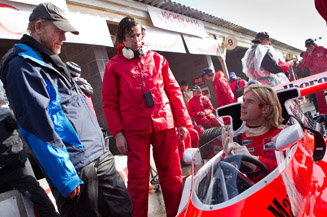Movie Review: Rush
By Matthew Huntley
October 3, 2013
The same goes for Niki, who’s willing to estrange himself from his family, take out a personal loan from the bank and buy his way into the international racing circuit. Unlike James, though, Niki is less reckless and more mathematical in his approach; he views Formula One racing as just that - a sport that can be solved and won with a definite formula. His own rush comes from formulating ways to go faster and sustaining his title, all while firmly avoiding anything with a risk factor greater than 20%.
The woman in Niki’s life is Marlene (Alexandra Maria Lara), who’s impressed by the way he’s able to discipline himself and evaluate any and all decisions on a cost-benefit basis. Even when the two decide to marry, he tells her, “I suppose if I was going to do this with anyone, it might as well be you,” suggesting his decision stems from pragmatism instead of love. But he gradually comes to adore her and the movie’s heart comes from their budding relationship, which gives it a fair amount of poignancy.
We’re also struck, on a technical level, by Anthony Dod Mantle’s cinematography, which is exceptional in the way it places us, quite literally, in the driver’s seat and allows us to see the world from Hunt and Lauda’s perspectives. The racing scenes are vibrant and convincing, even when they’re mixed with digital effects. Oddly enough, though, one of the most important shots doesn’t take place in a car, but in a hospital room when Niki is putting on his helmet, and all the elements of photography - depth of field, focus and colors - play an important role. It’s moments like these that elevate Rush above the traditional sports movie label and into the realm of a film about people who play a sport.
Is Rush transcendental? No. Does its historical context and classic Hollywood structure make many scenes feel obligatory? Yes. But by the end, we come to see James Hunt and Niki Lauda as two real people who we care about. This is underlined by the newsreel footage at the end, which also makes us recognize just how spot-on the casting was when it came to finding actors who looked the part of each man. Hemsworth and Brühl are dead ringers for their real-life counterparts, and more importantly, they infuse them with personality and depth. They and the movie help us understand what was at stake for the racers, and this realization not only makes Rush solid entertainment, but it gives it meaning.
Continued:
1
2
|
|
|
|




